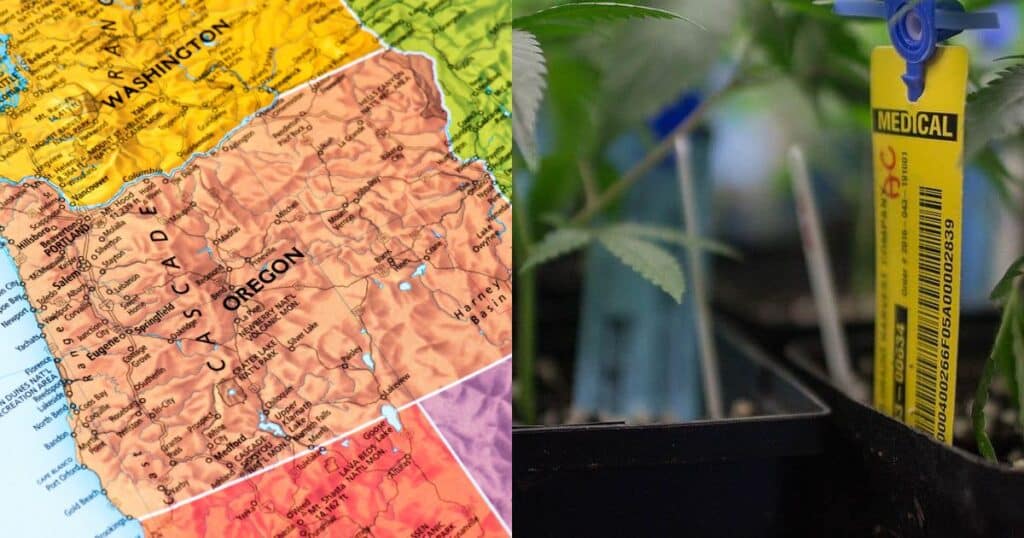In the agricultural world, timing is everything—especially for cannabis farmers who operate under the ever watchful eye of regulators concerned about diversion to the unregulated markets. Yet, an unnerving pattern has emerged within Oregon’s cannabis industry, spotlighting METRC, the company behind the state-mandated seed-to-sale tracking system.
METRC’s protracted delay in implementing a long overdue software update, as mandated by the Oregon Liquor Control Commission (OLCC), raises significant concerns.
A Delayed Update with Significant Consequences
In March 2023, the OLCC passed a rule that would allow one plant tag to represent 100 plants, moving away from the costly and labor-intensive one-to-one tagging requirement. This change promised to alleviate significant financial and operational pressures on cannabis farmers. However, METRC has been dragging its feet, requesting multiple extensions that have cumulatively led to well over a year to implement a minor software change.
The timing of these delays is particularly suspect. The original deadline was in January 2024 but METRC requested an extension until April of 2024. As that deadline looms METRC is already asking for a 2nd extension pushes the deadline out until the end of June, which conveniently falls just after the point at which outdoor farmers must commit to another year’s worth of plant tags—imposing unnecessary costs for an additional season.
This situation does not merely reflect inefficiency; it has farmers in Oregon questioning whether this is one last money grab from the industry, exploiting farmers’ dependence on regulatory compliance and the lack of pushback by the regulators in demanding timelines be met.
The Real Cost of Procrastination
METRC’s reluctance to complete the software update goes beyond a mere inconvenience; it represents a significant financial burden on farmers who are already navigating thin profit margins. The cost of purchasing an individual tag for each plant, coupled with the time invested in attaching these tags and managing the associated data, adds up to a substantial overhead expense—one that could be mitigated by the proposed rule change.
This delay forces farmers to question the intentions behind METRC’s actions. Is the prolongation of this simple software update a tactical move to increase revenue through the sale of plant tags?
The Cost: There were 4,023,423 plant tags sold in Oregon in 2023 and roughly 80% of those tags were sold to outdoor farmers.
At a cost per tag of $0.45 a tag that amounts to $1,440,000 of revenue that METRC should book if they wait just a little bit longer to implement this change. The administrative burden and labor costs I estimate are roughly equivalent to these costs. So cumulatively Oregon farmers would be out roughly $2.75 – 3 million dollars. This also does not include the environmental impact these 4 million tags have and this is just in Oregon.
A Professional Perspective on the Delays
From my professional experience in cybersecurity and working with development teams, such delays in software updates are uncommon, especially for changes that seem relatively simple on the surface. This leads me to speculate that the update was never properly prioritized by METRC. The lack of transparency and justification for these delays are troubling, and the OLCC should take a more proactive role in demanding explanations from METRC.
Why has this change taken so long?
Why have alternative solutions, which could alleviate the industry’s burden, not been considered?
A Call for Transparency and Action
The cannabis community deserves transparency and fairness from the entities that wield significant influence over the industry’s operational landscape. METRC’s delay not only strains the financial resources of outdoor cannabis farmers but also erodes trust in the regulatory framework supposed to foster a healthy, competitive market.
This situation calls for immediate action from regulatory bodies like the OLCC to hold METRC accountable and ensure that the intended rule changes are implemented without further delay. The need for regulatory compliance should not be weaponized as a financial strategy at the expense of the hardworking farmers who form the backbone of the cannabis industry.
A Look to the Future
Is there a future without plant tagging?
Many in the cannabis industry, including myself, believe that plant tagging is not only unnecessary but also intrusive. The primary risk cited for its necessity concerns diversion to the unregulated market. However, if diversion is a genuine concern, it is highly improbable that such activities occur at the plant tagging phase. Diversion, if it were to happen, would logically take place post-harvest, when the product is more manageable and less conspicuous.
Verbal testimony provided by the Oregon State Police during the original rule discussion was cited as saying they could not recall a single case they investigated involving cannabis that was linked to the movement of mature and flowering plants.
In the future I believe we need to move to a model that cannabis is treated like any other agricultural product. What is most important is traceability of the final products to assist in recall.
About The Author

Adam is the co-founder of Utokia, a micro-tier cultivator in Oregon. He has been at the forefront of the cannabis industry since 2016. Our commitment to quality and experiences is reflected in every aspect of our operations. Before embarking on his journey in the cannabis industry, he honed his skills in cybersecurity, developing a keen eye for detail and a strong foundation in technological solutions that have served him well in navigating the complexities of cannabis cultivation and sales. Outside of his professional pursuits, he is an avid gamer, finding both relaxation and strategic inspiration in the gaming world.
Website: www.utokia.com
Socials (insta, twitter, facebook, linkedin, tiktok): @utokiaherbco























